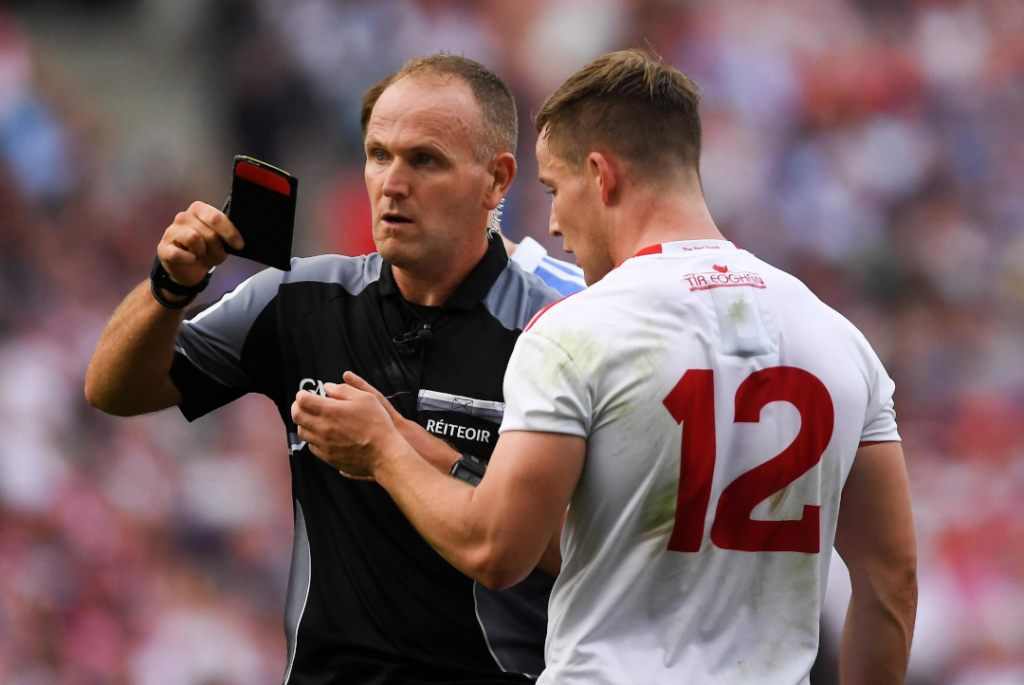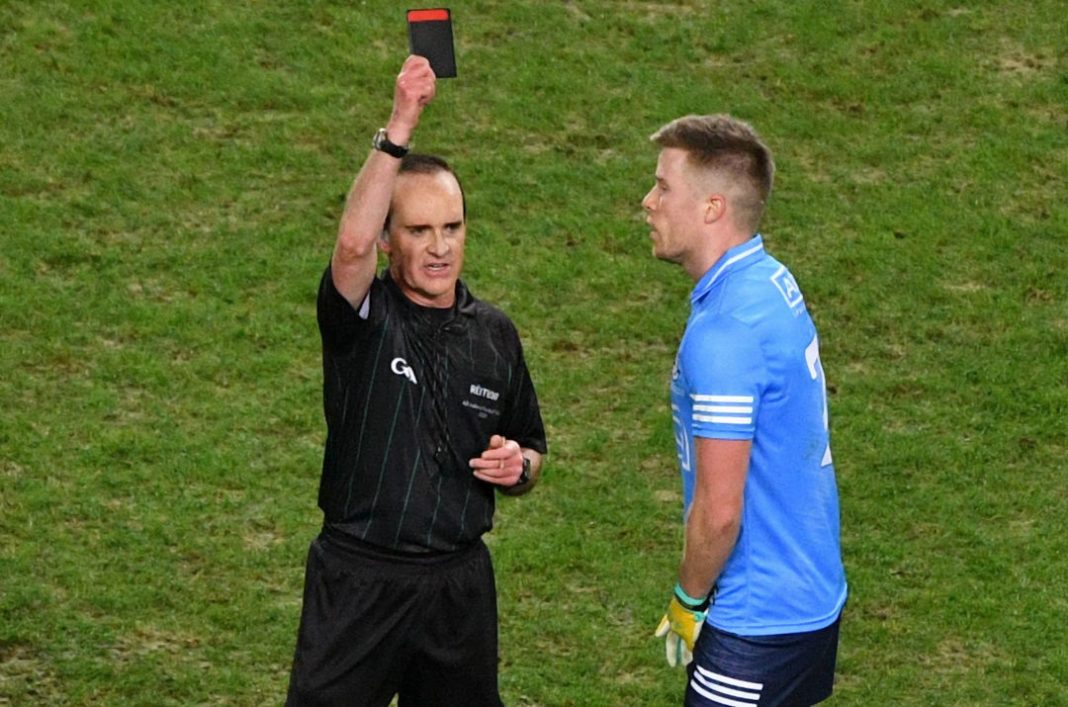GAA Black Cards
The GAA Black Card is a fairly recent addition but has become a more influential part of the game. Originally, the black card was a soft red where a player had to leave the game but could be substituted. Now, the black card represents a sin bin where the guilty party spends ten minutes on the touchline.
The idea of a sin bin has been used in rugby games for many years and remains an effective deterrent. The original use of a black card was deemed too lenient for the offending side, so they adopted a harsher punishment. Now, any team that receives a black card has to play ten minutes with 14 players instead of 15.
What is a Black Card GAA Offence?
They originally intended the black card in hurling or Gaelic football to deter players from committing cynical fouls. These are the types of challenges where a player’s only intention is to stop the opponent by any means necessary. That includes deliberate pulls, trips, and off-the-ball collisions. Any player who attempts one of these fouls is trying to stop the opponent’s attack or reduce the likelihood of the opposition scoring.

We have all seen fouls like this in almost every major sport. The only problem is they take something away from the game. Gaelic sports tried to introduce the black card to curb unsportsmanlike behaviour. After all, if you look at the clips of old, we owe so many significant moments to players not cynically bringing down the opposition. Sure, a dirty challenge could win you a match, but you can’t argue it also robs us of a scintillating game.
When are Black Cards Administrated in the GAA?
There are many ways to pick up a black card, and the Football Review Committee (FRC) plans on introducing an additional rule in 2025. In case you missed all the recent Gaelic football rule changes, you can read our summary article.
To receive a black card GAA, a player must commit one of the following offences.
- Deliberately pull down an opponent.
- Intentionally trip an opponent with the foot, arm, hand, or leg.
- To deliberately interfere with a player after they have played the ball away. Or intentionally taking him out of the movement of play.
- To use abusive or obscene gestures to an opponent or teammate.
- Aggressive or threatening behaviour to match officials.
- New Rule (2025): To delay an opponent in possession of the ball by holding and not grounding the player.
It is up to the referee to decide whether a player has breached one of these rules. They can administer other cards instead of a black one, even when a player violates these rules. For example, a player could act aggressively at the referee and receive a red card. This is probably where a lot of fan frustration comes from, as you can never be sure when the referee will utilise the black card in GAA sports.
Why was the Black Card Introduced?
The rule came about after an increasing number of cynical fouls reared their ugly head into hurling and Gaelic football. Cynical fouls are not new to the sporting world, and soccer fans will know all about them. If you have been watching soccer, players would take out the opposition to stop a dangerous attack before it materialised into a goal-scoring chance. These terrible fouls ruin the flow of a game and they often involve little or no attempt to win the ball. However, soccer officials are yet to fully address this issue whereas, GAA sports now have the black card.
Although they introduced the black card into Gaelic sports in 2014, it has not been as effective as we would like. The black card has reappeared in hurling and has been used to great effect for Gaelic football. If enforced correctly, it will help improve the quality of GAA matches for years to come.
What is the Black Card GAA Rule?
If a player violates any of the rules above, the referee can award a black card. Originally in GAA sports, a black card removed a player from the game, but the manager could replace them. The card was like a red, but instead of going a man down for the rest of the match, you could replace the player with someone from your bench.
After a short while, they concluded this punishment was not harsh enough. They then upgraded the GAA black card using the sin bin rule in rugby. Instead of being able to replace a player or losing a player for the rest of the match, the offender gets a time-out.
Any player who receives a black card must spend ten minutes on the sideline and can only rejoin the match at the referee’s signal during a break of play. The black card stays in effect in extra time but does not stop a player from participating in a shootout.
They can upgrade the black card in Gaelic football to a red if the player commits another foul. Just like two yellow cards equals a red, two black cards will also see a player ejected from the match. Any player that receives a black and a yellow card will be sent off. Goalkeepers have a special rule where the management can replace them either by using an outfield player or by making a substitution.
Is There a Black Card in Hurling?
Yes, and it’s back. The black card is back in effect for hurling, and it is active for Gaelic football. Hurling’s black card had slightly different rules than the one we see in football. They awarded it for cynical pulls and trips, plus if anyone used the hurley carelessly. Where the rule fell apart was with the subjective calls made by the referees. They had to judge the strength of an opportunity and decide whether the foul was black card worthy. Plus, they had to consider the proximity to the sideline. Was the chance close enough to be a goal?
GAA rules are always changing. They adjust some rules over time to enhance their effectiveness, while others are either adopted or disregarded. As fans of the sport, it’s confusing to have rules change without clear official communication. That is why we are here to set the record straight for black cards in hurling and other Gaelic sports. The black card GAA has already appeared in hurling this season. However, only time will tell how effective the card will remain.
Black Card GAA and Soccer Blue Card
If you are a fan of GAA sports and soccer, you would have seen the news. The rule makers are considering introducing the sin bin rule to soccer. While the introduction has seen mixed reviews in Gaelic Sports, soccer fans are keen to avoid this kind of punishment.
In theory, the blue card should be what the fans want to see. Too many times are players hacked down in the build-up to promising chances. Taking the black card from the GAA into soccer should deter cynical fouls from the game. However, many feel this rule will have a negative effect.
In Gaelic sports and rugby, having 14 players on the pitch often means very little when in possession. You can wind down the clock and still create chances even with a man down. The fear for soccer is teams preparing to go a man down and effectively parking the bus for ten minutes. While it’s unrealistic to assume every team will do this, the essence promotes a negative approach. The black card has been used to mediocre effect in GAA events, and we predict it will not last when introduced to soccer matches.
When Did the Black Card Rule Change?
They introduced the original black card rule in 2014 after a steep rise in cynical fouls. If you were watching GAA events, it was infuriating to see promising plays being ended early by dirty tactics. Finally, the league had enough, and they stepped in with a black card. Originally, the card worked like a red. They kicked the player out of the match, but you could replace them with any other player from your bench.
The league changed the rule in 2020 for Gaelic football but seemed to abandon its use in hurling. But, it has made a return. There is a black card system in hurling, and players can still receive a yellow or red card. Entering the third season of the new black card system, and we think it still has a long way to go. Hopefully, as the officials get used to the new card, they will distribute it more effectively in the coming seasons.



